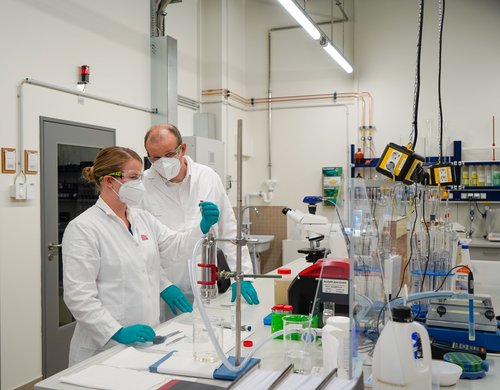
Two years of pandemic: health minister Heike Werner visits the Bauhaus-Universität Weimar
On Monday 18 July, the Thuringian minister will stop off in Weimar as part of her summer tour. The extent to which waste water should be analysed all across Germany to monitor the COVID-19 pandemic and other pathogens will be discussed during an exchange with Professor Silvio Beier and other partners from the pilot project »SARS-CoV-2 waste water monitoring in Thuringia« (CoMoTH).
What does waste water reveal about us? And how can it be used to combat infectious diseases? Professor Silvio Beier, who heads the Professorship for Technologies of Urban Material Flow Uses within the Faculty of Civil Engineering, is certain: »With widespread monitoring of our waste water, a kind of early-warning system could be established in Thuringia for pandemics. The findings from the CoMoTH joint project already prove today that this analytical method reliably maps the occurrence of infections and is faster and more cost-effective than using PCR tests for monitoring.«
The interim project findings were presented in Erfurt on 20 June 2022 during a workshop on waste water-based epidemiology. It became clear during this event that the virus is still present in waste water in a high concentration and that the infection statistics registered by the health authorities do not reliably reflect the current reality. According to project leader Professor Beier, close cooperation with the health authorities is essential, on both the project implementation and data usage. »The CoMoTH project in which the Thuringian health authorities are involved has contributed significantly to this. The use of artificial intelligence based on pattern recognition for trend analyses could also become an important tool.«
Research into COVID-19 at the Bauhaus-Universität Weimar
The »CoMoTH« project is funded by the Thuringian Ministry of Economy with around €370,000 and is scheduled to run until August 2022. It involves 23 sewage treatment plants and thus about 40 percent of the Thuringian population. The Bauhaus-Universität Weimar and Analytik Jena GmbH are affiliated partners; Hamm-Lippstadt University of Applied Sciences and Hamburg University of Technology are involved as cooperation partners. One of the declared research goals of the CoMoTH project is to determine the possibilities for permanent widespread waste water monitoring for SARS-CoV-2 in Germany.
In addition to the waste water monitoring led by Professor Beier, other researchers at the Bauhaus-Universität Weimar are also investigating pandemic-related issues. The Professorship of Building Physics headed by Professor Conrad Völker is analysing how infectious breathable air spreads indoors, for example, and has thus proven how effective the pandemic regulations of social distancing, wearing a face mask, and ensuring good hygiene and sufficient ventilation are in combatting the pandemic. The professorship cooperated with intensive care physicians, musicians and product designers to develop solutions for clinics and the cultural sector that are as quick and practicable as possible.
Summer tour of the Thuringian health minister
Health Minister Heike Werner will visit health care institutions, doctors and scientists to take stock after two years of pandemic. The aim is to share the different experiences that the various stakeholders have had over the past two years. The health minister said of her upcoming tour: »With this summer tour, we wish to combine thanking stakeholders for all their hard work in the past two years with a shared learning process. Hence we are using this year’s summer tour to share the experiences gained in different places and situations, and to prepare together for what may still lie ahead in the autumn and winter.«
Minister Werner will visit the »SARS-CoV-2 waste water monitoring in Thuringia« project at the Bauhaus-Universität Weimar at 11:30 am on Monday 18 July 2022 (Mensa am Park meeting room on the first floor). Media representatives are warmly invited to attend.
In case of questions about the CoMoTH project, please contact Professor Silvio Beier from the Professorship for Technologies of Urban Material Flow Uses (+49 (0) 36 43 / 58 46 58; silvio.beier[at]uni-weimar.de).
